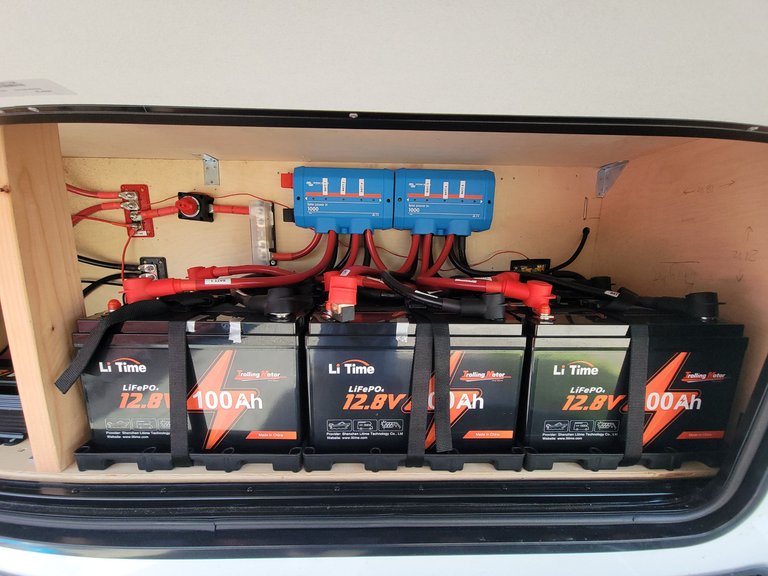LiFePO4 Batteries
For those of you that correctly suggested I upgrade to LiFePO4 batteries, here you go:

Because of the numerous drawbacks associated with lead-acid batteries, I decided to upgrade to LiFePO4 batteries, a type of lithium-ion battery chemistry. LiFePO4, or lithium iron phosphate, batteries offer several advantages over traditional lead-acid batteries, including higher energy density, longer lifespan, lighter weight, and no toxic gas emissions.
I found an excellent Black Friday deal from LiTime, a Chinese manufacturer known for producing quality lithium batteries. It's worth noting that the majority of lithium battery manufacturers are based in China. I purchased a total of eight LiFePO4 batteries, but due to space constraints in both my storage bay and on my bus bars (the two blue boxes), I only ended up using six of them. The other two I'm using for another project but more on that another time.
To ensure the batteries were safely and securely installed, I built a custom plywood box to section them off from the rest of the storage bay. This box not only helps in organizing the batteries but also provides an added layer of protection. Additionally, I mounted the batteries using battery trays lined with rubber to protect them from vibration, which is crucial to maintaining the integrity and longevity of the batteries.
An essential component of the LiFePO4 battery setup is the Battery Management System (BMS). The BMS is a critical safety and performance feature that monitors and manages the individual cells within each battery. Here are some of the key roles of the BMS:
Overcharge Protection: The BMS prevents the batteries from being overcharged, which can cause damage or even a fire hazard. It ensures that each cell is charged to the optimal level.
Over-discharge Protection: It prevents the batteries from being discharged too deeply, which can permanently damage the cells and reduce the battery's lifespan.
Temperature Monitoring: The BMS constantly monitors the temperature of the batteries to prevent overheating, which can lead to thermal runaway and potential fire risks.
Cell Balancing: It ensures that all the cells in the battery pack are balanced, meaning they are charged and discharged evenly. This balancing extends the overall lifespan of the battery pack.
Short Circuit Protection: The BMS protects the batteries from short circuits, which can cause significant damage or pose safety risks.
Data Logging: Some advanced BMS units can log data about the battery's performance, health, and usage patterns, providing valuable insights for maintenance and troubleshooting.
Here are some of the key benefits I’ve experienced with the LiFePO4 batteries:
Higher Energy Density: LiFePO4 batteries have a much higher energy density compared to lead-acid batteries. This means they can store more energy in a smaller, lighter package, which is particularly beneficial in applications like travel trailers where weight and space are critical.
Longer Lifespan: These batteries typically have a lifespan of 2000-5000 charge cycles, significantly longer than the 300-500 cycles of lead-acid batteries. This translates to years of reliable performance with minimal degradation.
Lightweight: Each LiFePO4 battery is considerably lighter than its lead-acid counterpart, reducing the overall weight of my trailer and improving fuel efficiency.
No Toxic Emissions: Unlike lead-acid batteries, LiFePO4 batteries do not emit harmful gases during charging or discharging, eliminating the need for special ventilation and reducing the risk of hazardous exposure.
Maintenance-Free: LiFePO4 batteries require virtually no maintenance, unlike lead-acid batteries which need regular water level checks and terminal cleaning.
Stable and Safe: LiFePO4 batteries are known for their thermal and chemical stability. They are less prone to overheating and do not pose a significant risk of explosion or fire compared to other types of lithium-ion batteries.
Efficient Charging: These batteries can be charged and discharged at higher rates, making them more efficient and quicker to recharge, which is a major advantage during travel.
Overall, switching to LiFePO4 batteries has been a significant upgrade, providing me with more reliable and efficient power for my trailer. The initial investment was higher compared to lead-acid batteries, but the long-term benefits in terms of performance, safety, and convenience make it a worthwhile decision.
Note: I wrote the initial paragraphs and then enhanced them with the help of ChatGPT.
Switching to LiFePO4 batteries seems like a smart move for the trailer brother. They're certainly lighter, last longer, and also need less maintenance. Oh Plus, the safety features with the BMS is a bit reassuring. Good man !BEER
Appreciate your comments!
Glad you took suggestions.
!discovery 29
Cheers!
Thank you for your witness vote!
Have a !BEER on me!
To Opt-Out of my witness beer program just comment STOP below
View or trade
BEER.Hey @enforcer48, here is a little bit of
BEERfrom @isnochys for you. Enjoy it!Learn how to earn FREE BEER each day by staking your
BEER.😎👊 nice looking batt bank!!
Thanks!
This post was shared and voted inside the discord by the curators team of discovery-it
Join our Community and follow our Curation Trail
Discovery-it is also a Witness, vote for us here
Delegate to us for passive income. Check our 80% fee-back Program